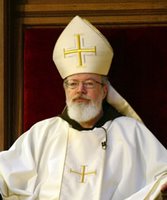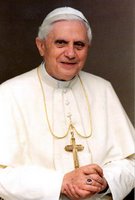
Reproduced below is the Vatican translation of a Catechetical Dialogue that took place October 15, 2005, between some children who were preparing to celebrate their First Holy Communion and Pope Benedict XVI.
.
"What Are Your Memories?”
.
Andrea: Dear pope, what are your memories of your First Communion day?
Benedict XVI: I would first like to say thank you for this celebration of faith that you are offering to me, for your presence and for your joy. I greet you and thank you for the hug I have received from some of you, a hug that, of course, symbolically stands for you all.
As for the question, of course I remember my First Communion day very well. It was a lovely Sunday in March 1936, 69 years ago. It was a sunny day, the church looked very beautiful, there was music.... There were so many beautiful things that I remember. There were about 30 of us, boys and girls from my little village of no more than 500 inhabitants.
But at the heart of my joyful and beautiful memories is this one — and your spokesperson said the same thing: I understood that Jesus had entered my heart, He had actually visited me. And with Jesus, God Himself was with me. And I realized that this is a gift of love that is truly worth more than all the other things that life can give.
So on that day I was really filled with great joy, because Jesus came to me and I realized that a new stage in my life was beginning, I was 9 years old, and that it was henceforth important to stay faithful to that encounter, to that communion. I promised the Lord as best I could: "I always want to stay with You," and I prayed to Him, "but above all, stay with me." So I went on living my life like that; thanks be to God, the Lord has always taken me by the hand and guided me, even in difficult situations.
Thus, that day of my First Communion was the beginning of a journey made together. I hope that for all of you too, the First Communion you have received in this Year of the Eucharist will be the beginning of a lifelong friendship with Jesus, the beginning of a journey together, because in walking with Jesus we do well and life becomes good.
.
"The Light of Sunday for All Our Family"
.
Giulia: Your Holiness, everyone tells us that it is important to go to Mass on Sunday. We would gladly go to it, but often our parents do not take us because on Sundays they sleep. The parents of a friend of mine work in a shop, and we often go to the country to visit our grandparents. Could you say something to them, to make them understand that it is important to go to Mass together on Sundays?
Benedict XVI: I would think so, of course, with great love and great respect for your parents, because they certainly have a lot to do. However, with a daughter's respect and love, you could say to them: "Dear Mommy, dear Daddy, it is so important for us all, even for you, to meet Jesus. This encounter enriches us. It is an important element in our lives. Let's find a little time together, we can find an opportunity. Perhaps there is also a possibility where Grandma lives."
In brief, I would say, with great love and respect for your parents, I would tell them: "Please understand that this is not only important for me, it is not only catechists who say it, it is important for us all. And it will be the light of Sunday for all our family."
Alessandro: What good does it do for our everyday life to go to holy Mass and receive Communion?
Benedict XVI: It centers life. We live amid so many things. And the people who do not go to church, do not know that it is precisely Jesus they lack. But they feel that something is missing in their lives. If God is absent from my life, if Jesus is absent from my life, a guide, an essential friend is missing, even an important joy for life, the strength to grow as a man, to overcome my vices and mature as a human being.
Therefore, we cannot immediately see the effects of being with Jesus and of going to Communion. But with the passing of the weeks and years, we feel more and more keenly the absence of God, the absence of Jesus. It is a fundamental and destructive incompleteness. I could easily speak of countries where atheism has prevailed for years, how souls are destroyed, but also the earth. In this way we can see that it is important, and I would say fundamental, to be nourished by Jesus in Communion. It is He who gives us enlightenment, offers us guidance for our lives, a guidance that we need.
.
“Please Stay with Me Always."
Anna: Dear pope, can you explain to us what Jesus meant when He said to the people who were following Him, “I am the bread of life?"
Benedict XVI: First of all, perhaps we should explain clearly what bread is. Today, we have a refined cuisine, rich in very different foods, but in simpler situations bread is the basic source of nourishment; and when Jesus called Himself the bread of life, the bread is, shall we say, the initial, an abbreviation that stands for all nourishment.
And as we need to nourish our bodies in order to live, so we also need to nourish our spirits, our souls and our wills. As human persons, we do not only have bodies but also souls; we are thinking beings with minds and wills. We must also nourish our spirits and our souls, so that they can develop and truly attain their fulfillment.
And therefore, if Jesus says: "I am the bread of life," it means that Jesus Himself is the nourishment we need for our soul, for our inner self, because the soul also needs food. And technical things do not suffice, although they are so important. We really need God's friendship, which helps us to make the right decisions. We need to mature as human beings. In other words, Jesus nourishes us so that we can truly become mature people and our lives become good.
Adriano: Holy Father, they've told us that today we will have Eucharistic adoration. What is it? How is it done? Can you explain it to us? Thank you.
Benedict XVI: We will see straightaway what adoration is and how it is done, because everything has been properly prepared for it: we will say prayers, we will sing, kneel, and in this way we will be in Jesus' presence.
But of course, your question requires a deeper answer: not only how you do adoration but what adoration is. I would say, adoration is recognizing that Jesus is my Lord, that Jesus shows me the way to take, and that I will live well only if I know the road that Jesus points out and follow the path He shows me.
Therefore, adoration means saying: "Jesus, I am Yours. I will follow You in my life, I never want to lose this friendship, this communion with You." I could also say that adoration is essentially an embrace with Jesus in which I say to Him, "I am Yours, and I ask You, please stay with me always."
.
Address of the Holy Father at the Conclusion of Meeting
.
Dear boys and girls, brothers and sisters, at the end of this very beautiful meeting I can find one word only: thank you.
Thank you for this feast of faith.
Thank you for this meeting with each other and with Jesus.
And thank you, it goes without saying, to all those who made this celebration possible: to the catechists, the priests, the Sisters; to you all.
I repeat at the end the words of the beginning of every liturgy and I say to you: "Peace be with you"; that is, may the Lord be with you, may joy be with you, and thus, may life be good.
Have a good Sunday, good night and goodbye all together with the Lord. Thank you very much!









